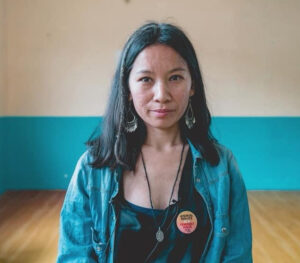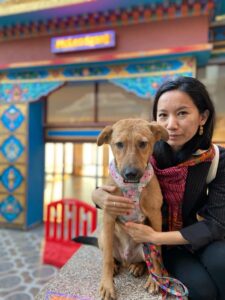 It’s a rainy August afternoon in Dharamsala and Dr Dawa Dolker greets me warmly outside Delek Hospital – the Tibetan hospital. She guides me through a staff entrance, offering a friendly smile to each of her colleagues passing by, to her dental clinic. Within moments of meeting I notice the side of her left hand, tattooed with the word Vegan; the V in an iconic green font. When she decided to get this tattoo as a birthday gift for herself in 2016, the tattoo artist questioned the highly-visible location. Dawa knew it was in exactly the right place: unavoidable, direct, conversation-starting.
It’s a rainy August afternoon in Dharamsala and Dr Dawa Dolker greets me warmly outside Delek Hospital – the Tibetan hospital. She guides me through a staff entrance, offering a friendly smile to each of her colleagues passing by, to her dental clinic. Within moments of meeting I notice the side of her left hand, tattooed with the word Vegan; the V in an iconic green font. When she decided to get this tattoo as a birthday gift for herself in 2016, the tattoo artist questioned the highly-visible location. Dawa knew it was in exactly the right place: unavoidable, direct, conversation-starting.
“When I’m talking I use my hands,” she says, referencing her extensive public speaking experience. “I know that until death I will be speaking for the rights of animals.”
Dawa clearly remembers her transition to veganism: it was Saka Dawa in 2015, the morning after she ceremoniously cooked chicken kebab, one of her (formerly) favorite dishes. She had committed to one month of veganism to honour the holy days, but forgot on that first morning and began eating the leftover poultry. When her friend asked about her vegan experiment she had a sudden insight about eating animals: “From that moment on, I committed to life-long veganism.”
A profound connection to animals dates back to Dawa’s childhood in her South India birthplace, Mundgod, in a Tibetan colony. She remembers seeing cows giving birth but never witnessed a natural death; similarly, she remembers that dogs would be picked up but never come back. As she began making sense of what happened, she learned that these slaughters were enacted in the name of the Animal Birth Control (ABC) mass sterilisation programme. “Now as a Buddhist I look at animals as family; every sentient being has been your mother.”
 It’s Saturday and Dawa would ordinarily have a full day of dental appointments scheduled, but she had to cancel them due to the water pressure issues that are so often experienced in McLeod Ganj. Still, she’s committed to spending the day in the clinic with her dental assistant for emergency visitors. Within a few minutes of us settling into our discussion, a young man walks in with a mouth injury. Her assistant attends to his cracked teeth gently and we pause our conversation while Dawa, too, offers her diagnostic insights in a candid, down-to-earth manner.
It’s Saturday and Dawa would ordinarily have a full day of dental appointments scheduled, but she had to cancel them due to the water pressure issues that are so often experienced in McLeod Ganj. Still, she’s committed to spending the day in the clinic with her dental assistant for emergency visitors. Within a few minutes of us settling into our discussion, a young man walks in with a mouth injury. Her assistant attends to his cracked teeth gently and we pause our conversation while Dawa, too, offers her diagnostic insights in a candid, down-to-earth manner.
“Whenever a monk or nun comes in”, she says, “I always ask them: ‘What do you think about meat eating?’”
Asking this question to a particular patient is what led Dawa to deepen her devotion to Buddhism after a period during which she felt disconnected from the Dharma. The question prompted a conversation that inspired her patient to suggest she meet his guru. At their first meeting, she brought soy milk as an offering and spoke openly about her identity as a vegan Buddhist. To her surprise, her (now current) guru responded: “You are doing the work of monks and nuns … we only speak of the Dharma but you are doing it in action. I am 100% standing with you.”
Tears streamed down her face on hearing his words, at the shock of being supported in response to a conversation that typically stimulates discomfort. He encouraged her to pursue animal rights activism and start a non-government organisation, building on the Dharamsala Vegan Movement (DVM) she founded in 2016.
“A vegan activist in the Tibetan community is very rare,” Dawa says, referring to the meat-centric eating habits of Tibetans. Naturally, unoriginally, I ask about the Buddhist perspective toward meat-eating. “That is the most loved question and also the most difficult,” she responds, adding that to reconcile this she carefully studied Buddha’s teachings on meat-eating. “Buddha never said it’s okay to eat meat; he acknowledged that receiving meat as alms is acceptable if it has threefold purity.”
 Her primary motivation for veganism is animal rights. Over the past six years, the DVM community has conducted street-based outreach efforts and collaborated with international groups. She gives credit to their efforts for the availability of vegan food in Dharamhsala, which was non existent less than a decade ago. Thanks to the international diversity and presence of His Holiness, Dawa regards the city as the place that enabled her veganism and spirituality to flourish. Locally, she is well-known as “a person people can reach out to” and she has been approached by people telling her they went vegan because of her.
Her primary motivation for veganism is animal rights. Over the past six years, the DVM community has conducted street-based outreach efforts and collaborated with international groups. She gives credit to their efforts for the availability of vegan food in Dharamhsala, which was non existent less than a decade ago. Thanks to the international diversity and presence of His Holiness, Dawa regards the city as the place that enabled her veganism and spirituality to flourish. Locally, she is well-known as “a person people can reach out to” and she has been approached by people telling her they went vegan because of her.
On Sundays, Dawa is often on the streets of Dharamshala vaccinating and spaying street dogs and caring for other animals; she has responded to calls for rats, cows and monkeys, to name a few. Regularly facilitating adoptions for street dogs, Dawa prepares them for adoption by “washing and cuddling them” before delivering them to a new home, which she surveys in advance. Another dimension of her activism is feminism; with the hashtag #puppybeti (beti is “daughter” in Hindi), drawing attention to gender discrimination towards adopting puppies.
Weaving through Dawa’s activism, veganism and dentistry is the thread of the Dharma. “I say this like an affirmation: “I am vegan for all sentient beings: ‘I am vegan for you, I am vegan for the Chinese, I am vegan for Putin, I am vegan for Trump, I am vegan for the slaughterhouse workers, for the rapists, for the terrorists, for His Holiness the Dalai Lama’ … so this is basically me right now.”




 Print
Print Email
Email













